Those BookNotes friends that have followed us for a while know that I have often offered lists of titles on Christian perspectives on politics, government, and, more generally, public life and civic engagement. We have run BookNotes columns on civility (for instance, here) and we’ve attempted (not always successfully, some might say) to be fair and balanced, holding forth the lofty idea that we as church folk who follow Jesus are not to be unequivocally loyal to any political party. As black preacher Tony Evans says, when Jesus comes back, he won’t be riding a donkey or an elephant. Right?
And yet, as every missional book puts it these days, we are called to be involved in the world, secular saints, so to speak. Among my favorites of this sort these days are Exiles on Mission: How Christians Can Thrive in a Post-Christian World by Paul Williams (Brazos Press; $19.99) and The Symphony of Mission: Playing Your Part in God’s Work in the World by Michael Goheen & Jim Mullins (Baker Academic; $22.99.) They are strong, serious reads, well worth working through.
Maybe you saw the video I posted at facebook (both my own, and the bookstore group’s page) last week (which was fun) and you’ll recall I announced the brand new book by the Southern Baptist Ethics and Religious Liberty Commission, Russell Moore, who just released The Courage to Stand: Facing Your Fear without Losing Your Soul (B+H; $22.99.) That’s part of it, finding God’s courage when we are anxious or fearful to speak up. It isn’t new but we often recommend Kathy Khang’s Raise Your Voice: Why We Stay Silent and How to Speak Up (IVP; $16.00.) Just a few weeks ago we got the new paperback edition of a book I recommended nearly a year ago by Jim Wallis, Christ in Crisis: Reclaiming Jesus in a Time of Fear, Hate, and Violence (HarperOne; $17.99.) Of the many books we’ve highlighted lately about racial reconciliation and multi-ethnic ministry, several pushed towards greater involvement in social affairs. For instance, I highly recommend the latest by Brenda Salter McNeil Becoming Brave: Finding the Courage to Pursue Racial Justice Now (Brazos Press; $21.99) and the recent one by Dr. Drew G.I. Hart, Who Will Be a Witness: Igniting Activism for God’s Justice, Love, and Deliverance (Herald Press; $18.99.)
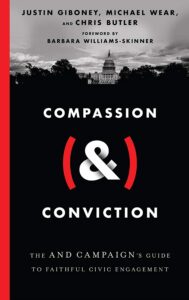 One of the most popular books we’ve been selling this past month or two is Compassion (&) Conviction: The AND CAMPAIGN’s Guide to Faithful Civic Engagement co-authored by Justin GIboney, Michael Ware, and Chris Butler (IVP; $22.00.) It is extraordinary for a number of reasons and we’re glad to continue to get the word out about it. You can see my quick review of it here (and cash in on the 20% discount, too.)
One of the most popular books we’ve been selling this past month or two is Compassion (&) Conviction: The AND CAMPAIGN’s Guide to Faithful Civic Engagement co-authored by Justin GIboney, Michael Ware, and Chris Butler (IVP; $22.00.) It is extraordinary for a number of reasons and we’re glad to continue to get the word out about it. You can see my quick review of it here (and cash in on the 20% discount, too.)
One of the shortest and simplest and most balanced (and so useful!) calls to political holiness is a small book by Dr. 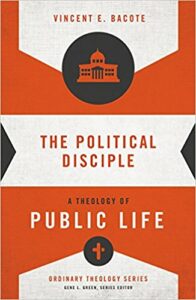 Vincent E. Bacote called The Political Disciple: A Theology of Public Life (Zondervan; $11.99.) You could get a few and give ’em out to those just starting to think about this.(You can see my review of this little treasure here.) Allowing the gospel of Christ’s Kingdom to shape our approach to public life and God’s love to motivate us to be more eagerly involved in society as God’s salt and light and leaven has been a theme here in many, many columns.
Vincent E. Bacote called The Political Disciple: A Theology of Public Life (Zondervan; $11.99.) You could get a few and give ’em out to those just starting to think about this.(You can see my review of this little treasure here.) Allowing the gospel of Christ’s Kingdom to shape our approach to public life and God’s love to motivate us to be more eagerly involved in society as God’s salt and light and leaven has been a theme here in many, many columns.
I now want to highlight just a few recent books on political life as such that I think are useful and important for us as citizens. Along the way, I will share some links to previous columns and older books that I highly recommend as well about this process of relating faith and our calling to good citizenship. For now, though, I want to help you focus on our political moment.
READING ABOUT HEALTHY MODELS OF RELATION FAITH & POLITICS AS A SPIRITUAL DISCIPLINE
Right now and continuing strong in the months following the election we will be inundated with punditry and preaching from various corners of the public square. For some of us, we have already grown numb from it all, soured for sure. Having a book or two nearby that reminds to to think Christianly, to hear and filter and be discerning about the controversies of the day through the lens of Christian truths and God’s grace in Christ will be for many of us a lifeline to sanity. I recommend it as a spiritual discipline. For many of us, such reading might not only be a happy counter-balanced to the spin and hype, hostility and cynicism, roiling around us, but it will be part of the cost of discipleship — using books as tools to help you be intentional about nurturing within your heart and mind, God’s views, God’s mind and heart, receiving and keeping a Biblically-shaped imagination, worldview, orientation, perspective. Books can remind you of that task and can help you do it.
The Bible tells us to “test the spirits” (I John 4:1) and warns us to be careful not to get tossed around by the waves or blown around by every wind of ideology (Ephesians 4:14.) Indeed, Paul tells us not to be “taken captive” by un-Christ-like ideologies (Colossians 2:8.) We are called to be “conformed” to the ways of the world around us and we can show that we are free of the culture’s pressures by seeking “the renewal of your mind” (Romans 12:1-2.) These books will help you apply these Biblical admonitions. I believe that. I bet you sense the need for some help in this. These books could be a part of your regimen for Christian political health in the weeks and months ahead. They can help.
Unlearning or qualifying our often primal loyalties to our political parties and philsophies, or learning to inhabit new (Christ-like) attitudes around political life will take some time and effort. Most of us don’t have too much support in such a project, not even in church, I suspect. I believe buying a book or two is a major step to deepen your commitment to “taking every idea captive” (2 Corinthians 10:5) even in our lives as citizens. Reading them prayerfully just might help you adjust the longings of your heart, working their faithful way to reform your desires, your hopes, your dreams, your social imagination. These books will help you pull that lever in the voting booth (or send that ballot in the mail) with the prayer “Thy Kingdom come.”
Recent books on faith and politics. Every book mentioned 20% off. Please tap on the ORDER tab at the end which will take you to our secure order form page.
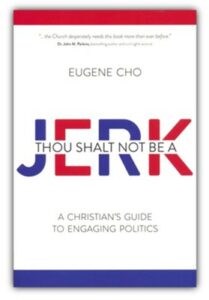 Thou Shalt Not Be a Jerk: A Christian’s Guide to Engaging Politics Eugene Cho (Cook) $17.99 OUR SALE PRICE = $14.39
Thou Shalt Not Be a Jerk: A Christian’s Guide to Engaging Politics Eugene Cho (Cook) $17.99 OUR SALE PRICE = $14.39
That last line of mine above, that suggested that even as we vote we pray that somehow it doesn’t just advance our own party’s agenda, but that, more deeply, it points as a signpost towards the Kingdom coming? That our vote is a prayer “They Kingdom Come”? I suppose it could be said that that is what this book is about. I highlighted it at BookNotes a month ago because I am a fan. (The author, Eugene Cho, has written a previous book about poverty issues and now is the new Director of Bread for the World (BFW), one of our favorite and I think most important Christian groups for voters who want to be informed about legislation that matters, that can literally save lives.
What I had written about this book previously at BookNotes took a cue from the playful title, suggesting that it is mostly about political civility. How we can be passionate without being mean-spirited. We need that right now, of course, and, I am afraid, will need it even more so next month, no matter who wins the Presidential election. This idea that we can find points of agreement with others and work for the common good is so important and this book is really helpful about that very matter. Cho’s stories about real-life congregations that have done just that is inspiring and offers good models to emulate. Mutual respect, cooperation, common ground can be found a real-life friendships can emerge from what could be disagreeable circumstances. I’ve seen it in my own activism and take heart from some of the stories in Thou Shalt Not Be a Jerk. But, again; brace yourself. If you care about stuff one way or the other, your going to have to be reminded of some of this.
As much as I might promote this book as a guide to civility and mutual respect and common ground in an age of polarization, it is also a primer on Christian political thinking. Cho does insist that our citizenship is a gift from God which we must steward faithfully. We are not, as followers of Christ, supposed to just vote for anybody that we like or anybody that will help us, but we must seek higher motivations and deeper principles. We can learn to see our citizenship as an expression of our discipleship and we can — we must — take into consideration the most vulnerable and needy. We care, also in our politics, for others. The Bible says over and over that the task of the state is to establish justice for all, and that includes the poorest and those who are marginalized by societal forces.
Along with chapters on building bridges and living our our convictions appropriately, Cho shows us how to deepen our perspective, to have more depth in our analysis. He has a chapter about not lying, about not getting played or being manipulated. (Yes, this is the rough and tumble of real citizenship and real politics.) We can love others, trust God, and testify that Christ is still the King of kings.
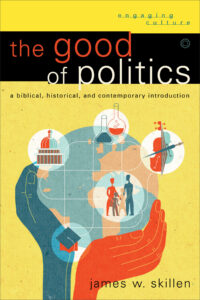 I like this book a lot. It’s a breezy read, good for citizens starting to think faithfully and generously about the common good and political involvement. And Cho is a talented and experienced leader. It is a bit weak on the question of what the Bible actually says about government and what might be considered a Christian political philosophy or the call to wise statecraft. For that, you really need a book like James Skillen’s weighty The Good of Politics: A Biblical, Historical, and Contemporary Introduction (BakerAcademic; $22.99) which I reviewed at length here. There are some other good ones mentioned, too in that old column.
I like this book a lot. It’s a breezy read, good for citizens starting to think faithfully and generously about the common good and political involvement. And Cho is a talented and experienced leader. It is a bit weak on the question of what the Bible actually says about government and what might be considered a Christian political philosophy or the call to wise statecraft. For that, you really need a book like James Skillen’s weighty The Good of Politics: A Biblical, Historical, and Contemporary Introduction (BakerAcademic; $22.99) which I reviewed at length here. There are some other good ones mentioned, too in that old column.
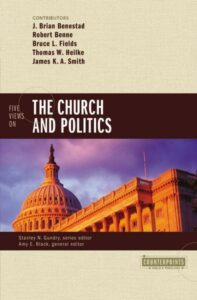 Even if you are unsure that Skillen is fully right about government in Christian perspective, it is still the flagship book to read on this, the magisterial overview of the subject we need. But for a fuller debate of five different viewpoints by five different sorts of Christians, see Five Views on The Church and Politics edited by Amy E. Black (Zondervan; $19.99.) Compare and contrast differing views of our political calling from Lutheran, Catholic, Reformed, Mennonite, and a black church perspective. I described it at greater length here. And don’t miss the other titles I mention in that BookNotes column, too. Click through but be sure to come back.
Even if you are unsure that Skillen is fully right about government in Christian perspective, it is still the flagship book to read on this, the magisterial overview of the subject we need. But for a fuller debate of five different viewpoints by five different sorts of Christians, see Five Views on The Church and Politics edited by Amy E. Black (Zondervan; $19.99.) Compare and contrast differing views of our political calling from Lutheran, Catholic, Reformed, Mennonite, and a black church perspective. I described it at greater length here. And don’t miss the other titles I mention in that BookNotes column, too. Click through but be sure to come back.
One very recent one along these lines of big but foundational studies that has gotten rave reviews is by an author who offers critique to Skillen’s Kuyperian-influenced vision, David VanDrunen. It is called Politics After Christendom: Political Theology in a Fractured World and has been called groundbreaking and brilliant.
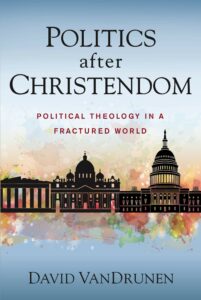 Politics After Christendom: Political Theology in a Fractured World David VanDrunen (Zondervan Academic) $29.99 OUR SALE PRICE = $23.99
Politics After Christendom: Political Theology in a Fractured World David VanDrunen (Zondervan Academic) $29.99 OUR SALE PRICE = $23.99
This is not the place for me to go into detail, but I think I have my beefs with Dr. VanDrunen’s “two kingdom” theology, but many have said this book is a must read. It is serious, hefty, almost tedious. But his ideas are very, very important. For instance, Calvin Theological Seminary thinker John Bolt says, “This clear and thoughtful work is a game changer.” Wow.
Or consider this, by Christian legal scholar and historian, John Witte, Jr. of Emory University:
This volume is a brilliant capstone to David VanDrunen’s project on Reformed political and legal teachings. It again features probing exegesis of biblical teachings and their reception history; creative retrieval and reconstruction of natural law theories, Two Kingdoms ontologies, and covenantal theology; and a bracing engagement with enduring questions of authority and liberty, justice and mercy, custom and community, rights and resistance. This volume and its prequels have earned VanDrunen a place high on the honor roll of law and religion scholarship and of Reformed political theology.
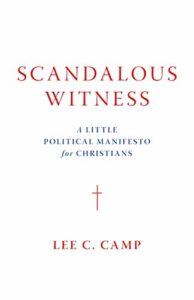 Scandalous Witness: A Little Political Manifesto for Christians Lee Camp (Eerdmans) $19.99 OUR SALE PRICE = $15.99
Scandalous Witness: A Little Political Manifesto for Christians Lee Camp (Eerdmans) $19.99 OUR SALE PRICE = $15.99
Well, if you want to skip some of the heady, deeply Biblical studies of the nature of law, the task of the state, the ways in which Biblical truths can or cannot be applied in a pluralistic democracy, if you are less interested in Skillen overview of how various Christian thinkers down through history have or have not developed a sturdy, sound, view of statecraft, but want a bit more practical application, this is semi-scholarly, lectures given in a church setting, offered as 15 fiesty propositions. It’s punchy. Each proposition is described in a long paragraph opening each chapter, and there is a (black and white) art piece which he uses to explore and further unpack the implications of each particular proposition.
Camp is a good writer, erudite and pleasurable for those who like crisp, elegant, provocative prose. It is a manifesto, after all, so it is not particularly nuanced. He doesn’t quite write the political essay the way Wendell Berry or even Marilynne Robinson might, but it is incisive and probing. David Gushee calls his writing “astringent.” Each chapter is maybe 10 or so pages but you won’t breeze through them quickly; Scandalous Witness is what one reviewed called “tart and sassy.” I think it’s good stuff, shocking to some, perhaps, as he does go after some pretty sacred cows.
The orientation of Scandalous Witness emerges from the assumption that the gospel is, in fact, a “scandal” to the world as it is described in 1 Corinthians 1:23, and we have lost that edge because of our accommodation to the powers that be. Camp writes with fierce conviction, against being shaped or formed or, heaven forbid, loyal to any political party. He’s somewhat Anabaptist in this sense, with a strong view of the tension between the church and the world, Christ’s Kingdom and the partisan ideologies of the culture. He takes big pot-shots at the religious right, but he also is not particularly happy with the mainline church and its seeming comfort with the Democratic party. He is what Scot McKnight has called “an equal opportunity critic.” Ha.
Here are just a few of the many rave reviews he has received:”
“With characteristic intelligence, humor, and grace, Lee Camp argues that the American church today has earned itself the curious distinction of having largely ‘destroyed its own witness.’ But Lee is not just a prophet of doom. He proposes an alternative. It may be a scandalous one, to be sure, but it is a courageously hopeful one as well.” Miroslav Volf
— author of A Public Faith: How Followers of Christ Should Serve the Common Good
“It’s impossible for me to read Scandalous Witness without a growing awareness of the ways I’ve conflated the Gospel with nationalism. I love my country, but I belong to Jesus, and that belonging frees me and calls me to share in the costly suffering love that takes precedence over all else. Lee has outlined clearly and beautifully all the ways, large and small, we Christians abandon our first love and turn to national interest–which in the end is another form of self-interest.” Ashley Cleveland — Grammy-winning gospel singer, author of Little Black Sheep
“With a scholar’s eye and a storyteller’s knack for narrative, Lee Camp exposes the current inability of American Christianity to bear witness to the gospel. We are asking the wrong questions, taking the wrong turns and pledging the wrong loyalties. Both parts contrarian and constructionist, Camp finds himself in the family tree of St. Paul, Augustine, Hauerwas, Davison Hunter, and others, challenging those who call themselves Christians to rearrange our bastardized version of the faith towards a more prophetic, historical and theologically courageous imagination.” Drew Holcomb
— Magnolia Records recording artist
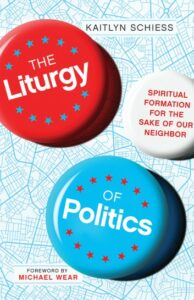 The Liturgy of the Politics: Spiritual Formation for the Sake of Our Neighbor Kaitlyn Schiess (IVP) $17.00 OUR SALE PRICE = $13.60
The Liturgy of the Politics: Spiritual Formation for the Sake of Our Neighbor Kaitlyn Schiess (IVP) $17.00 OUR SALE PRICE = $13.60
Of the many books I’ve read on this topic — and I’ve read a lot — this is absolutely one of my all time favorites. I found myself nodding in agreement over and over and rejoicing that I was actually seeing these words on the page, turning page after page, delighting in the goodness and wisdom I was encountering. How could such a young writer not only learn to sparkle as a writer and storyteller and teacher, but be so widely read, and be wise enough to draw on such interesting, generative, even surprising sources? I kept flipping back to the endnotes, over and over, as they were themselves a delight (especially for this book nerd who so appreciates when a somewhat rare or lesser known author shows up. And with helpful quotes from James K.A. Smith, Jurgen Moltmann, and Martha Nussbaum, Kate Bowler, James Skillen and Richard Mouw, Richard Middleton, Fleming Rutledge, and Willie James Jennings, I kept nodding and grinning. Where did she find all these good books? How does she integrate so many interesting, interesting influences? It is the mark of a good author, in my book, and The Liturgy of Politics is a very good read.
I announced it briefly in a previous BookNotes and a few who pre-ordered it have given us fabulous feedback. I’m not alone in thinking this is a fabulous and important book.
Here are two key things Kaitlyn Schiess is doing in this recent work, and therefore two different reasons to read it. It is about political life and it is about church life. And which rubs off on the other, how that works badly and how it could be otherwise. It is both a lament and critique as well as a constructive project to help us improve. It’s for political nuts and churchy folks. If your both, this book is screaming your name!
Firstly, she is asking the deep question about what story we are living in, what social imaginary, as some all it, what value-system or worldview shapes our engagement with political concerns? She is — as are most of the authors above (especially Lee Camp) — greatly distressed that we in the churches have allowed ourselves to be hoodwinked — captured to use the language of the Bible — by ungodly ideologies that then open us to be used and manipulated by the partisan powers that be. This is particularly egregious in evangelical churches who are part of the religious right, as her people were growing up and as she experienced first hand at Jerry Fallwell’s Liberty University when she was an undergrad there.) The legendary oddity of the recent religious right getting so zealously behind somebody so inconsistent with a Christian perspective/demeanor as Mr. Trump is only one example of how we have been shaped in our deepest thinking and desires by the ways of the partisan political forces. That is, she is wondering how we arrive at our political loyalties and our public theology and our voting habits. And it isn’t good.
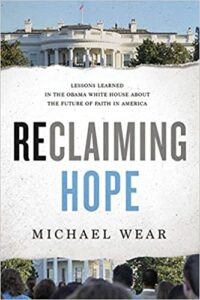 My friend Michael Ware (author of Reclaiming Hope, about his years in the Obama White House and now co-author of Compassion & Conviction, the book of the AND campaign) wrote a forward that is only a few pages but worth the price of the book. He sets the stage for Schiess’s work by reminding us of our call as Christians to be involved by not co-opted, bringing Christ’s ways into the public square. He says she writes as a voice of a new generation that sees spiritual formation as key to discipleship, but always for the world. And, that, similarly, if we are going to be involved in public life, we will need the Holy Spirit and congregation’s influence. It’s a beautifully written and very important foreword.
My friend Michael Ware (author of Reclaiming Hope, about his years in the Obama White House and now co-author of Compassion & Conviction, the book of the AND campaign) wrote a forward that is only a few pages but worth the price of the book. He sets the stage for Schiess’s work by reminding us of our call as Christians to be involved by not co-opted, bringing Christ’s ways into the public square. He says she writes as a voice of a new generation that sees spiritual formation as key to discipleship, but always for the world. And, that, similarly, if we are going to be involved in public life, we will need the Holy Spirit and congregation’s influence. It’s a beautifully written and very important foreword.
So the first part of the book is about this call to “think Christianly” about politics, and she reminds us that, indeed, there is a history of thought about these things and we dare not ignore the Bible or the church’s great tradition of coherent and intentional Christian theologizing. As one who has gone to seminary she is herself, she tells us, a book nerd and loves studying this stuff. (No wonder I linked her so!)
But here’s the big thing: she has learned well from James K.A. Smith and Tish Harrison Warren and Stanley Hauerwas and Robert Webber — as Smith puts it, you know, “we are what we love,” That is, our ideas about proper Biblical politics are not as important as what stories and dreams and hopes and values and symbols and images have formed our hearts. 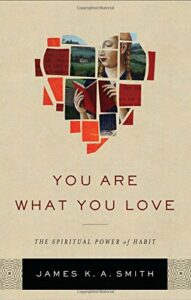 She realizes that the subterranean affective questions are most deeply religious: what do we feel about politics, what are we afraid of, what do we loathe, what do we want, what have we pledged allegiance to? Using Jamie Smith — You Are What You Love and his entire “cultural liturgy” trilogy but, of course, especially the third in the trilogy, Awaiting the King: Reforming Public Theology — she shows that our civic attitudes and beliefs and behaviors may most deeply be shaped not by thoughtful analysis of issues, but by the tug on our hearts and dispositions. That’s just how we humans work, it’s what the Bible says about our hearts. How we vote is not only about our heart’s longings and desires, our virtues and character, but it is most likely more
She realizes that the subterranean affective questions are most deeply religious: what do we feel about politics, what are we afraid of, what do we loathe, what do we want, what have we pledged allegiance to? Using Jamie Smith — You Are What You Love and his entire “cultural liturgy” trilogy but, of course, especially the third in the trilogy, Awaiting the King: Reforming Public Theology — she shows that our civic attitudes and beliefs and behaviors may most deeply be shaped not by thoughtful analysis of issues, but by the tug on our hearts and dispositions. That’s just how we humans work, it’s what the Bible says about our hearts. How we vote is not only about our heart’s longings and desires, our virtues and character, but it is most likely more 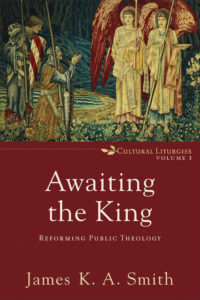 that than the level headed arguments we hold or the high-sounding principles we claim. Those are preceded by what habits of heart we’ve embraced and who we’ve become. As Andy Crouch has quipped, the things we do (“secular liturgies”) do things to us. We are shaped, for better or worse, below the surface, subconsciously, and we can be sucked into the gravitational pull of an ideology within a political party, without even really knowing it. The first several chapters of The Liturgy of Politics explores this as well as anything I’ve seen and I highly, highly recommend it.
that than the level headed arguments we hold or the high-sounding principles we claim. Those are preceded by what habits of heart we’ve embraced and who we’ve become. As Andy Crouch has quipped, the things we do (“secular liturgies”) do things to us. We are shaped, for better or worse, below the surface, subconsciously, and we can be sucked into the gravitational pull of an ideology within a political party, without even really knowing it. The first several chapters of The Liturgy of Politics explores this as well as anything I’ve seen and I highly, highly recommend it.
This call to ask probing questions about our deepest thinking and even more about our desires — about why we are apolitical or a zealous partisan (it works either way), or why we are angry about this or that issue or candidate, to ponder what sort of things we’ve made ultimate in our lives, and why that is, is so very important. Her own story is shared, she draws on some of the best writers on this question of how we learn and what shapes us most, and invites us to discern what direction our lives are unfolding, especially when it comes to our political lives. This is simply brilliant stuff, intersting, breezy, well informed, challenging but not at all shaming or overwhelming. Young or old, I highly recommend this first part of the book.
The second thing, though, is also important. This is where the subtitle of the book becomes more important. Like Smith before her, Schiess searches for deeper (thicker) liturgies and stories to supplant and transform the ones we’ve embraced (or that have embraced us) from the world. If you’ve been unhelpfully captured by the stories and images of the idols of a political party, where you start to mirror their ideology and assumptions, even if they are not necessarily consistent with a Biblical vision, what can possibly undo that? A few attack ads from the other side? No! We need a better story, a deeper spirituality, our deformed desires need re-ordered. We need a gospel-centered, Biblically robust, thick sort of worship and Christian liturgical spirituality that can shape us and reshape us in a faithful political direction.
Yes, that is the answer to the deformed politics that come from our accommodation to the ways of the world: we need to be reformed and we need to find ourselves in a new story, with new values, and new desires, new imagination shaped by the Kingdom of God. By Christ-likeness, be compassion and justice and wonder and grace. So the second half of the book is about how the church can influence us to be more caring neighbors, socially engaged in public life for the common good, better citizens for the sake of all our neighbors as love would have of us.
The church can do this not mostly by teaching us about politics, per se, but by developing the pregnant meanings and implications in the formative power of the liturgies we already employ. The simple example I often us: in what ways can passing the peace and pronouncing a blessing on folks at church each week make us into peacemakers in the world? Many have explored the relationship between the holy rituals of bread and table in Eucharist or communion and how that might make us more hospitable, maybe even more sensitive to food issues. (She wisely draws on Alan Streets’ good work.) People who celebrate a Savior who invites us to eat just might vote in a way that cares about hunger, eh?
Yep, and the chapter is called “Ekklesia: The Church as Training Ground for Political Engagement.” If you are interested in Christian politics, this book is a must. If you are a pastor, worship minister, youth mentor, or congregational leader, or campus ministry worker who influences others in their faith development, this is a resource you must have to help you realize the power of what you do as you shape God’s people for life in the world.
 Kaitlyn Schiess plumbs this stuff beautifully in ways I hadn’t even considered; one chapter is about “time, music, confession” and explores the calendar of the church year and the practices of sabbath. Another chapter is on “spiritual disciplines and political formation” and yet another is on how we read the Bible with an eye to public and political formation. (“A Story to Live Into” that one is called.)
Kaitlyn Schiess plumbs this stuff beautifully in ways I hadn’t even considered; one chapter is about “time, music, confession” and explores the calendar of the church year and the practices of sabbath. Another chapter is on “spiritual disciplines and political formation” and yet another is on how we read the Bible with an eye to public and political formation. (“A Story to Live Into” that one is called.)
The hour is late for me here and I feel like I am not scratching the surface of how valuable this lovely, thoughtful, stimulating book is. I learned much, was reminded of things I perhaps needed to be reminded of, and reveled as Ms Schiess connected dots all over the place. Her chapter on Augustine, by the way (“A Confession City”) is a great overview, drawing on the best Augustine scholars these days, including Eric Gregory and Charles Mathewes and Olliver O’Donovan. This gal knows her stuff and shares just enough to whet our own appetites.
So, this accesible, winsome book is about how the influences of modern politics shape/deform our attitudes and habits about citizenship (not to mention our very souls, so to 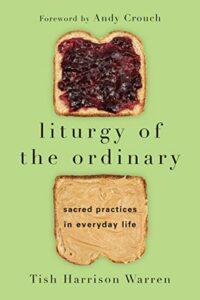 speak) and how our church lives might undo some of that, training us in deeper ways to be the kind of people that would relate faith and citizenship in a more Christ-like, coherent, faithful way. And the church does that in subtle, often symbolic ways. Just think of how Tish Harrison Warren describes her “practicing the presence of God” hour by hour through the day because of how she draws upon the practices of liturgical worship in The Liturgy of the Ordinary. I have my tongue in cheek as I say this, but The Liturgy of Politics by Kaitlyn Schiess is sort of Tish Warren for an election year. Ya know?
speak) and how our church lives might undo some of that, training us in deeper ways to be the kind of people that would relate faith and citizenship in a more Christ-like, coherent, faithful way. And the church does that in subtle, often symbolic ways. Just think of how Tish Harrison Warren describes her “practicing the presence of God” hour by hour through the day because of how she draws upon the practices of liturgical worship in The Liturgy of the Ordinary. I have my tongue in cheek as I say this, but The Liturgy of Politics by Kaitlyn Schiess is sort of Tish Warren for an election year. Ya know?
I’ve said over and over in BookNotes past that I think James K.A.Smith’s You Are What You Love is one of the most important books in recent decades. Others in that constellation, it seems to me, include Andy Crouch’s Strong and Weak. Again, Schiess is drawing on this generative, seminal volumes and using them to articulate this project of her, a project that she started in earnest a decade ago as she struggled to wonder why it was that so many of her evangelical friends thought about politics as they did. After much reading and writing and praying and learning (and, it seems, involvement in a very good local church and worshipping community and some degree of civic activism, too) Schiess has given us the fruit of her pondering, a volume that is unlike any other book on faith and politics I have read. It is, in a way, one of the ones we most need, pioneering, groundbreaking, wonderful. Thanks be to God.
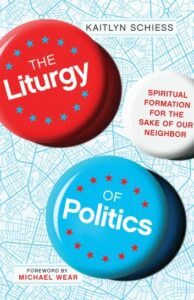
Don’t believe me, alone. Here are a few great recommendations by those who have endorsed it:
“This is the book I have been waiting for! There could hardly be a more important topic for our cultural moment than the connection between Christian formation and politics. Kaitlyn Schiess persuasively and powerfully argues that Christians are being deeply formed by the political currents in which we swim, although we don’t often realize it. She then casts a beautiful biblical and theological vision for intentional Christian formation that, by God’s grace, shapes us into disciples who love God as we attend to the life of the world. While giving detailed attention to how and why we practice prayer, Bible reading, worship, Sabbath, and the sacraments, Schiess casts a sweeping and winsome vision of the Christian life, including political engagement and so much more. This book will itself be deeply formative for all who read it. It needs to be read by pastors, youth ministers, worship leaders, small groups, college and seminary students, and all who care about faithful discipleship and formation today.” –Kristin Deede Johnson, dean and professor of theology and Christian formation at Western Theological Seminary, author of The Justice Calling.
“This is a powerful challenge from a young heart and a mature mind. Schiess seems to touch every unexamined habit of Christian thought, work, leisure, and worship. With a wide sweep of life’s liturgies and church liturgies, of spiritual formation and political responsibility, of Bible reading and communication with others, Schiess goes straight for the heart in relaxed conversation that packs a prophetic punch about our complacency, ignorance of Scripture, cultural conformity, and more. Her urgent message is for communities of Christian faith to repent and turn ourselves over entirely to God, as disciples of Jesus Christ have always been called to do. It is hard to imagine how this young woman has been able to read so widely and think so profoundly about so much of life. Here you’ll find fresh insight and compelling hope that will renew your labors for the coming of God’s kingdom. Young people, old folks like me, and everyone in between, read this book now!” — James W. Skillen, author of The Good of Politics, former president of the Center for Public Justice
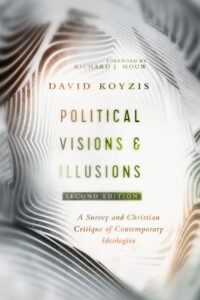 Political Visions & Illusions: A Survey & Christian Critique of Contemporary Ideologies Second Edition David Koyzis (IVP Academic) $33.00 OUR SALE PRICE = $26.40
Political Visions & Illusions: A Survey & Christian Critique of Contemporary Ideologies Second Edition David Koyzis (IVP Academic) $33.00 OUR SALE PRICE = $26.40
I realize this second edition of this book has re-issued last year, so it isn’t brand new. But it was out of stock for a while and when Tim Keller recommended it, we got a few calls from far way, folks hearing that we had a few. We did, and now we have more as they are back in stock again. So let’s list it here as if were a new one. Ha.
In the above book reviews I’ve mentioned idols and ideologies. The best book on the subject idols these days is the brand new Here Are Your Gods: Faithful Discipleship in Idolatrous Times by Christopher J. Wright (IVP Academic; $18.00.) Wright is a keen Biblical scholar and one of our most reliable authors in Scripture studies. This new paperback takes a major section (“The Living God Confronts Idolatry” from his magisterial The Mission of God: Unlocking the Bibles Grand Narrative, releasing it in a new form, which is essentially the first half of Here Are Your Gods. The second half is still meaty, but a bit more practical as Wright describes the way idols drive various political ideologies. He explores the Scriptural notion of “the nations” and looks at “God in the Political Arena” then and now. It is worth getting this book and reading that middle part this very week, I’d say. The third portion of this deep little book invites us to consider what it means to be God’s people in idolatrous times. It is both a scathing indictment and a hopeful guide away from our communal idols and the spirits of the age. I will write more about this later, I’m sure.
More specific to this post about politics, though, and of the ideologies that are diving both the right and the left in American political culture is this older book by David Koyzis that I’ve tried to sell repeatedly in these pages. (For instance here, or here.) Political Visions & Illusions: A Survey & Christian Critique of Contemporary Ideologies, as I mentioned above, was expanded and updated and reissued a year ago. It has some new material on populism and nationalisms (and has a lovely, wise foreword by Richard Mouw.) It is very important, I’d say and I sometimes get a bit breathy and enthusiastic pushing it, believing in it as I do. (Maybe it is because I know I need this book and dip into it regularly. You see, I find myself drawn to the best ideas of some of these disparate traditions, sometimes saying I’m a liberal conservative or a conservative liberal or some fusiony admixture, making me wisely eclectic or terribly undiscerning, depending who you ask.) Here, though, is how the publisher fairly plainly describes the book: “David Koyzis surveys the key political ideologies of our era, unpacking the worldview issues inherent to each and pointing out essential strengths and weaknesses.” Oh yeah, he does, with wisdom and insight and some occasional wit! Come on!
As Professor Koyzis walks us through chapters on liberalism, conservatism, nationalism, democracy (or democratism?) and socialism, he then invites us to transcend the ideologies by “affirming societal pluriformity.” He offers two faith traditions who have a worked out perspective on this, explaining in detail the Roman Catholic view of subsidiarity and the notion of sphere sovereignty that was central to the Anti-Revolutionary Party in the Christian democratic movement in Holland. These two historic Christian approaches are his alternative, so to speak, to the wrong-headed and possibly idolatrous ideologies of the left and the right, none of which are able to honor real pluralism and thereby do justice to all the differing people and organizations and institutions in a diverse society. In the midst of excursions into terrorism and racism and helpful contemporary examples of the abuse of power, this long-haul, bigger picture is a book that gets to the root of things and is thereby an exceedingly important contribution to our ongoing repentance and renewal as we seek political faithfulness from a Christian perspective.
Listen to David Guretzki, executive vice president and resident theologian, The Evangelical Fellowship of Canada
Few could have anticipated the major political upheavals witnessed since this book first came out in 2003. Yet Koyzis’s book has stood the test of time, ranking, in my opinion, as the best introduction to modern political thought from a Christian perspective. This updated edition is welcome in its inclusion both of newer literature and fresh examples to recent political developments. As a politically engaged theologian, I’m especially thrilled to see the addition of the ‘Concluding Ecclesiological Postscript’ that could very well serve as kind of theo-political compass for church leaders wanting navigational guidance on how churches should–and should not–engage in political action.”
Here is a helpful reminder of how important this is by Mary S. Van Leeuwen, professor emerita of psychology and philosophy, Eastern University, author of Gender and Grace.
“David Koyzis introduces readers to the range of political theories that have emerged and competed for dominance since classical times. He carefully and respectfully separates wheat from chaff in each of them in terms of a Christian worldview, and in a style that is clear, irenic, and persuasive. The second edition helpfully updates the first in terms of major political events of the past two decades. In an increasingly polarized world, this kind of book is essential reading for concerned citizens of all political and religious leanings.”
You could “google” David Koyzis and find a number of interviews and videos with him talking about worldviews and “religious”-like convictions that shape our lives. For instance, my friend Bob Robinson interviewed Koyzis at his (re)integrate podcast. Enjoy it here.
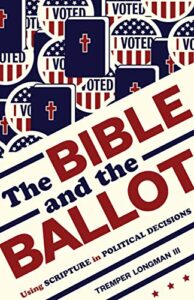 The Bible and the Ballot: Using Scripture in Political Divisions Tremper Longman (Eerdmans) $24.99 OUR SALE PRICE = $19.99
The Bible and the Ballot: Using Scripture in Political Divisions Tremper Longman (Eerdmans) $24.99 OUR SALE PRICE = $19.99
We got another one of those stupid voters guides put out by a well-intended Christian family organization in our state, all red white and blue, with checks of where candidates stand on this or that issues. They are a little more coy than they used to be but many of these simply mimic the positions of the Republican party whether they have any Biblical or even theological principles that are evident for that view or not. Why does a pro-life, pro-family group imply that a big defense budget is what true Christians want? For what reasons do some conservative Christian groups oppose environmental regulations, as if that’s an unbiblical thing on the face of it? Who says an anti-immigration policy is “pro-family,” let alone based on the Bible? (Geesh, folks, get out a concordance why don’t ya?) Who gets to say a certain tax policy is or is not “Biblical.” (It was to his embarrassment, in my view, that the otherwise thoughtfully conservative Bible scholar Wayne Grudem wrote a whole chapter in a book of his on (so-called) “Christian politics” supporting a conservative tax policy based on one half of a single Proverb. I hope his department chair tool him aside and gave him a brush-up Biblical Interpretation 101 review on how that’s a sloppy no-no. (That his publisher let him get away with it, misguiding the people of God like that, is also disappointing.) But when ideologies rule — as Kaitlyn Schiess explains in the above mentioned The Liturgy of Politics more graciously than I do — even well intended readings of the Bible get distorted and used for a partisan agenda.
Enter Biblical scholar Tremper Longman with a book that is a resource we really, really (really) need now more than ever. I admire Tremper, have met him, and know a person who was influential in his life as a student half a lifetime ago, so I am disposed to trust him a lot. His work is almost across the board stellar and he has written or edited dozens of serious books, mostly on the Old Testament. A few he has done with his old pal Dan Allender, too.
The Bible and the Ballot is about this project on how to use the Bible, or be instructed and informed by the Bible, on our views of political issues. Because it is what it is, it doesn’t go into the multi-dimensional questions that Kaitlyn raises about how we are actually formed in our political imaginations and desires. It doesn’t go into the ideologies behind the political philosophies that use or misuse the Bible, one way of the other. It not a volume on a Christian political option. It is, though, a summary of key Biblical passages that relate to contemporary social issues that are addresses in various political platforms. So, it is of limited use as we think about the development of a profound and coherent Christian political philosophy, but for a non-partisan handbook to Bible texts written by a Biblical scholar, this is very useful.
Here are two small criticisms which should not dissuade you from buying this asap. It isn’t as comprehensive as I might wish, and on a couple of issues, there are a couple of verses that I was surprised to not see show up in Longman’s overview. Understandably, the book is already 300 pages, so he couldn’t be comprehensive. Fair enough. Secondly, his sidebar summary of the key teaching from each unit was a bit bland for my tastes. I suppose this in intentional, not trying to be breathy or zealous or at all partisan. So he keeps it fairly straight forward, not polemical, just documenting core Bible teaching on topics ranging from war to racism, from abortion to poverty, from criminal justice and capitol punishment to the environment to same-sex marriage. One of the helpful topics is nationalism and patriotism and another I found very interesting was his foray into religious liberty. In each of these topics he shows relevant Biblical material and tries to wisely suggest ways those texts might inform a policy position that might approximate something we night say is “Biblically informed.”
Unlike those right wing or left wing voters guides that tend to be shallow, partisan and sometimes alarmist — ye gads, look how the “other side” is violating What The Bible Says — Tremper Longman’s new The Bible and the Ballot is reasonable and coherent, honest before the complexities of the texts and which texts influence or help us form faithful views. He believes we should be influenced by the Biblical texts but we must be honest about what they actually say and how to interpret them. As we say these days, it’s messy and it is hard to have much integrity as a reader of the Bible if we insist on taking some of our preferred passages and shoehorning them to prove the righteousness of our political agenda.
Therefore, the first quarter of this Bible and the Ballot book offers some overarching principles of Biblical interpretation, especially when trying to interpret the Bible for modern day social issues. This is thorny ground and good people may disagree about the methodology (what is also called hermeneutics) that shape our philosophy of interpretation. That is, you know you just can’t take some verse from Leviticus or some episode from Kings or some waring Jeremiah and willy nilly apply it today. Some find it complicated to even do that with plain teaching from Jesus, but we sure can’t do it easily from, say, a battle in Joshua, as if our military policy should be circling around a building with trumpets or our agricultural policy should be a strict application of Leviticus 25. Anyway, while it may be obvious (at least in some cases) when we ought not apply the Bible story verbatim for our modern social policy, there surely are principles to help us see divine patterns, learn how to be guided by God’s ways in the world as applied prudently to todays context.
Longman’s keys for reading the Bible well are helpful for any of us (about any issue about which we seek the Scripture’s illumination and guidance) and his interpretive principles are very useful. Part three of The B and the B offers “essential Biblical/theological themes” that will be carried throughout the book. This is all before he gets to specific issues. The Bible and the Ballot: Using Scripture in Political Decisions is not the only book we need as we become more intentionally wise about our civic posture and positions. But it is a great tool, a gift offered by a wise lover of God and one committed to the authority of God’s Word.
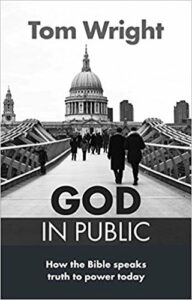 God in Public: How the Bible Speaks Truth To Power Today N.T. Wright (SPCK) $20.00 OUR SALE PRICE = $16.00
God in Public: How the Bible Speaks Truth To Power Today N.T. Wright (SPCK) $20.00 OUR SALE PRICE = $16.00
I’m so glad to list this even though it isn’t new, so I’m sort of cheating a bit here. But I bet it is new to many, even many Tom Wright fans. We import (through a US distributor) from the UK where is is published by a thoughtful, interesting publishing house there. These are essays former Bishop Wright gave to listeners in several locations in the UK and he starts off by noting that in both his academic training as a historian and New Testament scholar and in his ministerial training for being a parish priest there was this assumption that the Biblical gospel of Christ’s Kingdom is mostly for the church. Or maybe the scholarly guild. Neither Biblical scholars nor pastors and priests are adept at speaking about the world, let alone in the world. And then, as a Bishop, Wright became a member (as the state church has it in Great Britain) of the House of Lords. Oh my. By those years he already was learning to speak out about Biblical truth for contemporary culture and was eroding the unbiblical dualism that divides life into sacred and secular. (His first book published in the US, by the way, in the 1980s, was very much about culture and the modern society. By 2014 he had given enough public lectures about creation care, the arts, economics, science, justice and the like that HarperOne released Surprised by Scripture: Engaging Contemporary Issues. It’s very good.)
This imported British volume, though, is fabulous to be added on to this list about faith and politics. It is about power and justice (one was a lecture he gave at the London School of Economics.) As Wright became more convinced that his calling as a Bible scholar equipped him to serve the church and the culture, he increasingly had opportunity to weigh in on justice issues, on social causes, and on actual policy proposals. This book is an example of some of his visionary, Biblical teaching that has some application and traction in the world of public affairs.
There are 10 chapters, almost 185 pages. There are lectures on Pilate and Caesar and their encounter with Jesus in John 18-19; there is a chapter on the nature of law; there is a chapter about global terror and questions of war. In many of the chapters Wright is pushing back against secularism, those that might suggest that people of faith have no right or at least little to say of enduring worth as they bring a faith perspective to bear on the idols and issues and topics of the modern world. One chapter looks at postmodernism in public life, another looks at some of the idols of modernity still reigning in the power structures of the big empires.
One good chapter was a presentation entitled “God’s powerful foolishness in a world of foolish power” which of couse, takes its cue from “folly and wisdom, weakness and power: the gospel in Corinth.” One of the lectures (“Christian Virtue in Peace and War”) was actually given at the Royal Military Academy. Wow.
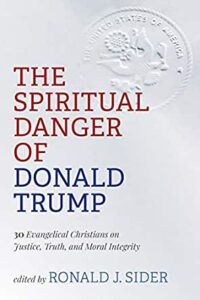 The Spiritual Danger of Donald Trump: 30 Evangelical Christians on Justice, Truth, and Moral Integrity edited by Ronald J. Sider (Cascade) $25.00 OUR SALE PRICE = $20.00
The Spiritual Danger of Donald Trump: 30 Evangelical Christians on Justice, Truth, and Moral Integrity edited by Ronald J. Sider (Cascade) $25.00 OUR SALE PRICE = $20.00
I have already mentioned this book in a BookNote last summer. I invited folks to pre-order it and said that there are contributors here that I think very highly of and a few who I count as friends or mentors.
As Termper Longman says of it, “My hope and prayer is that all Christians, whatever their present political leanings, will be open to the case made in this book.” As Ambassador Tony Hall, one of the great US Congressman who was so known for his advocacy for the poor and the starving (as he served in the US House) says, “I commend this book to anyone struggling to align their faith with their choices at the ballot box.
Let’s just say it bluntly. Almost anyone but the most partisan ideologies would admit that there are very good reasons to be troubled by the character and the behaviors and many of the policies of President Trump. From his chronic dishonesty to his antagonism with opponents and journalists to the weird disdain for science and truth and refusal to distance himself from racist and violent supporters, to his ill-informed, confused, and sloppy management within the Administration itself (decried by so many that once worked with him and could do so no longer — has there every been a President in US history that has had so many people quit or be fired?) More, there are the large character flaws — did he really pay off a porn star to silence her? Did her really call some poor nations “shithole” countries? Can you imagine what Jeremiah would say about tear-gassing peaceful citizen protesters so he could stand in front of a church and hold a Bible up, a Bible he doesn’t read. That some flamboyant religious right leaders love him is just inexplicable.
This book has significant and sometimes leading evangelicals weighing in on the anguish of having this dangerous man as the leader of our nation. A few chapters are biting; many are relatively gracious. Most are hard hitting with painful truth as they authors see it.
The Spiritual Dangers of Donald Trump is divided up into three main parts. The first part is on Mr. Trump the person. We have among others, pieces by Mark Galli and Vicki Courtney. There is a chapter by a Christian psychologist about God’s hatred for “a lying tongue.” Chris Thurman is another evangelical psychologist whose is well loved for his wise book about self-delusion called Lies We Believe. It’s good he is in here. One helpful chapter is “10 Reasons Why Christians Should Reconsider Their Support of Trump.” You could copy it and use it, I’m sure, if you are so inclined. We hope you get this book and share some of these chapters with those who need to wrestle with the matters.
One of the scholars, by the way, who contributed to this is Dr. Bandy X. Lee. She has advanced degrees in both psychiatry and theology and now practices through the Yale School of Medicine. She was so concerned about behaviors she saw exhibited by Mr. Trump that she edited a best selling volume called The Dangerous Case of Donald Trump: 37 Psychiatrists and Mental Health Experts Assess a President which inspired this more theological collection. In an earnest forward she tells of her own sense of being led by God to begin the process of this book, which she soon turned over to the impeccable Ronald J. Sider.
The second section is on “Evangelical Support of Trump.” This is lead off by long time right wing political operative Peter Wehner with an essay called “The Deepening Crisis in Evangelical Christianity.” Oh my, this is important, whether one is an evangelical or not. Ron Sider has an important piece called “Will The Evangelical Center Remain Silent in 2020?” He loves the evangelical world and he deeply wants to call the church to Jesus. He knows the Scriptures and he cares very much about the testimony we offer to the world around this campaign. I like how he draws on the significant, balanced method and agenda for evangelical social engagement “For the Health of the Nation” created by the National Association of Evangelicals. If only those self-appointed leaders of evangelicalism who are the loudest cheerleaders for the current President knew about this significant document created after painstaking work by evangelicals of various social and theological orientations. You can learn more about it in a big book Ron co-edited (with the late Diane Knippers) with bunches of significant evangelical thinkers and leaders doing chapters in 2005 entitled Toward an Evangelical Public Policy: Political Strategies for the Health of the Nation (Baker; $25.00.) It is a historic document and offered the sort of deeply theological framework we need today.
There are several other amazing pieces in this section of The Spiritual Danger of Donald Trump, from Stephen Haynes (a Bonhoeffer scholar) and a chapter co-authored by several evangelical leaders from the global evangelical community. Several of these pieces are very probing, analyzing the cognitive dissonance many evangelicals feel when they think about this unlikely partnership of conservative religion and the brutal Trumpian style. The famous African- American sociologist and Christian Dr. George Yancey has a very powerful piece, too. I really hope you buy this book and read it right away.
Part three in this anthology is what they call “theological, historical, and constitutional issues regarding President Trump.” This is sharp stuff, with serious chapters by Miroslav Volf and James Skillen and Joh Fea and others.
Steven E. Meyer is in here who is known as a thoughtful scholar of diplomacy who has served in the CIA and as an upper level manager at the Department of Defense. I mention this not only because his work is valuable and often compelling and because this chapter is excellent, but to show that these contributors are often fairly mainstream thinkers — not wild radicals, not even Sojourners or activists of the left. It’s been used before, but perhaps rarely so urgently, but the title of Meyer’s piece is “Quo Vadis, America?”
Julia Stronks has a chapter on constitutional questions — she is a Christian lawyer who teaches politics and history at Whitworth College. She calls for greater forbearance and toleration and observes that the Presidents style (the tweets, for instance) and his public statements and many of his actual policies and executive orders have eroded a sense of democratic values. It’s a strong piece and I recommend it.
I am glad for Ron’s closing sermon, a plea to return to Christ. He does invite us to listen well to each other and to pray together, no matter who wins the upcoming election. As he often does, he lists a handful of ways to take next steps, both visionary and hopeful as well as practical and admonishing. No matter what, he wants to to deepen our discipleship, live out our faith in a Christ-honoring way. As a book of his puts it that we still stock, I Am Not a Social Activist: Making Jesus the Agenda. Ron is a reliable thinker and earnest faith leader. I am glad he edited this volume and I commend it to you, urgently, now. Send us an order today, please.
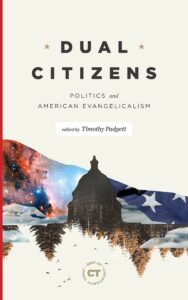 Dual Citizens: Politics and American Evangelicalism edited by Timothy Padgett (Lexham Press) $28.99 OUR SALE PRICE = $23.19
Dual Citizens: Politics and American Evangelicalism edited by Timothy Padgett (Lexham Press) $28.99 OUR SALE PRICE = $23.19
I applaud Lexham Press for doing a series of books like this, a handsome, trim sized hardback set called The Best of Christianity Today. They have anthologized all sorts of stuff from the earliest days of Christianity Today until today. One volume was from a several year series they did on evangelical theology and it is simply amazing. Another is various pieces written by John Stott. They are doing one soon to be released that is a collection of older Advent devotions that appeared in the magazine (some old, by the likes of Billy Graham.)
This new one may be one of the most valuable for anyone charting the early days and evolution of American (mostly white) evangelicals and their political posture, their public theology and their social positions. Of course, keep in mind, while evangelicals tended to be socially conservative, the phrase become popular in the 20th century (with CT their flagship journal) as a voice of Biblically orthodox but socially moderate Protestantism. That is, they were created to be an alternative to the fundamentalists. Until recently, there was a sharp divide between fundamentalists and evangelicals, although now the media lumps them together in unhelpful ways.
Here is how the publisher describes the value of this historical account of wrestling with the issues.
American evangelicals are often assumed to be a monolithic political force absolutely unified in their (right wing) priorities. This collection of articles from Christianity Today originally published between 1956 and 2016 tells a different story. Evangelical engagement with politics has been more complex than is often remembered. Dual Citizens reveals a variety of evangelical thought towards political developments over the past few decades. As such, it offers a real window into sixty years of evangelical political engagement
Here are a few historians and other public thinkers who compliment the volume:
At a time when evangelical Protestant presence in public life has come under significant criticism –including ridicule — this collection of essays from Christianity Today will enable insiders and observers to put the religious right in perspective. –D. G. Hart, Hillsdale College, author of American Catholic: Faith and Politics during the Cold War
This book is valuable to everyone interested in how evangelicals have thought about public issues and how they have acted in the public square. I also believe Christians will find it edifying as a reminder of the value of a faithful Christian witness, and a God who is working in history for his glory. –Michael Wear, author of Reclaiming Hope: Lessons Learned in the Obama White House About the Future of Faith in America
The book offers a priceless resource for historians as well as rank-and-file students of contemporary religion…. Edited volumes come and go — mostly go. But not this one. It will stand for years as a standard reference for understanding the inner texture of one of the largest and most influential Christian traditions of modern times. — Grant Wacker, Gilbert T. Rowe Professor Emeritus of Christian History, Duke Divinity School
The first chapter or unit is on CT writing about US Presidents. This is fascinating and for those of us who lived through any of this it will be very interesting. It has an early piece from 1956, a 1960 piece about the possibility of a “Catholic president” and a remarkable one about Kennedy’s assassination. There are essays about prayer, about protest, about the “political tightrope” from 1966. There were several about Watergate, one about President Ford, and several that are more contemporary. It is illustrative to see the piece about Reagan, surprising to see one by Rodney Clapp; there are well written ones by Philip Yancey and Sarah Pulliam and more. Of couse there is one by Chuck Colson — “How to Confront a President” written in 1994 (although he will show up often, later.) We get to see an early piece by the great journalist Mollie Ziegler Hemingway from 2009. Tony Carnes was the reporter weighing on President Bush after 9-11 and we see the magazine report about “The Bush Doctrine” that launched the Iraq War. There’s several more. And then the final three in this section include a famous 2016 editorial by Ron Sider on why he was going to vote for Hillary Clinton paired with one by James Dobson on why he supported Donald Trump and one by Sho Baraka on why he wasn’t voting for either.
The second part is about both the emerging roles of the Religious Right and a bit about the Evangelical Left. From CT’s moderate assessment of the mean-spirited Carl McIntire (1970) to Carl Henry’s classic “evangelical social concern” program to what were then called “radical Christians” there is a lot. One 1985 article compares and contrasts Charles Colson, Jerry Falwell, and Jim Wallis. There are a number of good pieces here — one written by Nancy Pearcey with Chuck Colson, another by Carolyn Curtis, yet several more by the editorial team on the issues of the day.
The third part includes positions the magazine took and editorials they ran on a wide range of global issues. My head spun when I saw the first one from 1956 penned by J. Edgar Hoover. Yikes. Some of these are remarkable for their historical value and one I re-read to educate myself — a Pearcey/Colson piece from 1999 “Does Kosovo Pass the Just-War Test?” There were missionary writers and Billy Graham weighing in and various pieces about ISIS, the most recent from 2014.
The fourth unit includes editorials about domestic affairs. Much of the writing in this section is about racism, poverty, and economics. It is fascinating to see what some evangelical leaders thought about segregation in 1957 or about Selma in 1965. There was a self-effacing piece about discrimination (in 1968) and a piece called “Race and Economics” by Francis Schaeffer in 1974. Wow.
And, yes, here is the editorial “Abortion and the Court” written in January of 1973.
I was intrigued to see various sorts of insights about the development of the evangelical pro-life stance. There are several. Standouts include Ron Sider’s piece from 1996 about “our selective rage” calling for a more consistently pro-life view. It could have been written last week. Orthodox writer and thinker Frederica Matthewes-Green has a piece from 1999. In 2001 CT weighed in about “changing hearts and laws” and the 2015 editor Katelyn Beatty’s impressive piece “The Power of Pro-Life Women” is included. Glad for that.
The final dozen or so essays range from 1956 to 2014 and there are a variety of editorials on various topics relating to the theme “God and Country.” There is writing on civil disobedience, on civil religion, a piece from 1957 about how government service can be a Christian vocation. (I was surprised to see that, for some reason, using the language of vocation, then.) I liked a number of these short pieces and found myself wanting to revisit a few more.
This book is loaded with good insight (even if often quite contextualized, emerging from its own social location, obviously.) There are some essays that are in my view pretty off-base. A few are brilliant, having stood the test of time. For inspiration and overtly evangelical Christian social and political thinking, Dual Citizens is valuable, if uneven. For historians and any who want to see the roots and fruits of the vision Carl Henry and the others had, hoping to present a Biblically-based, conservative but engaging theological alternative to both rigid and sectarian fundamentalism on one had and often theologically muddled, mainline social gopsel liberalism on the other, it is priceless. To see the somewhat evolving perspectives of this standard-bearer journal (loved by some, hated by others), Dual Citizens is a true treasure trove.
Please tell us how you’d like your order shipped — USPS Media Mail is cheaper and slower; USPS Priority Mail is more costly but much quicker. Feel free to ask for more details about your own order if you’d like. We’re happy to help. Thanks.
BookNotes

SPECIAL
DISCOUNT
20% OFF
ANY BOOK MENTIONED
+++
order here
this takes you to the secure Hearts & Minds order form page
just tell us what you want
inquire here
if you have questions or need more information
just ask us what you want to know
Hearts & Minds 234 East Main Street Dallastown PA 17313
read@heartsandmindsbooks.com
717-246-3333
